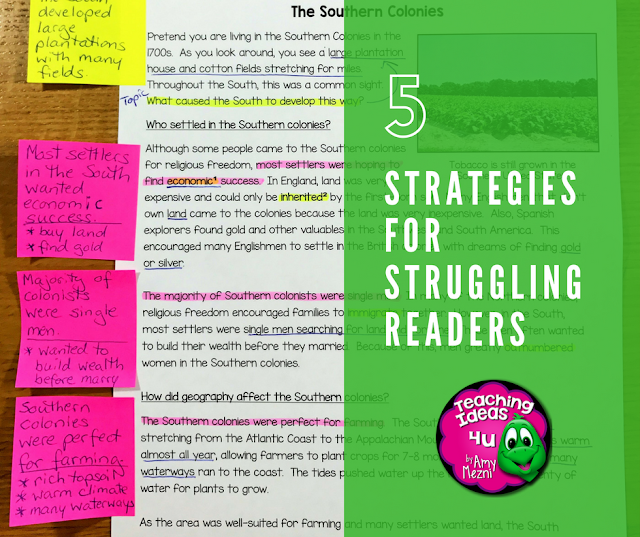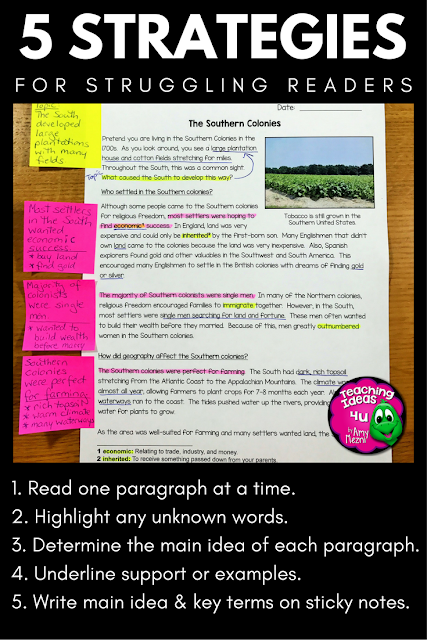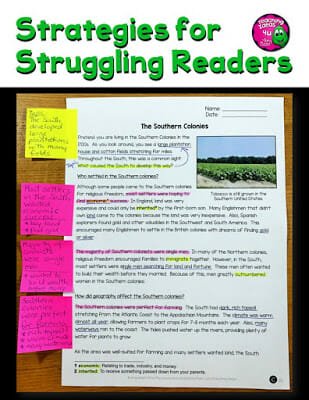5 Strategies for Struggling Readers
As much as I love to read, sometimes I dreaded teaching reading. I was reading by four and everything in language arts came easily to me - it just clicked. When I had students that didn't improve their reading with my strategies, I didn't understand why. Now that I am working with my son, I am understanding why many of those strategies just don't help him.
Don't Read the ENTIRE Reading Passage
Oh boy. I learned straight off the bat to stop my son from doing this. What a nightmare! Students who struggle with reading don't like to read. All he did was keep reading no matter what happened. He would skip words and entire lines, misread words, and make all kinds of errors. His goal was to get done with reading as soon as possible.
Instead Read One Paragraph at a Time
A poor reader gets overwhelmed easily. Looking at a whole page of reading causes panic and frustration. Instead, tell your students that you are only focusing on one paragraph. Stress the importance of identifying the key ideas in each paragraph before moving on.While reading the paragraph, highlight any unknown words, then identify the main idea of the paragraph. Identify the support for or any example of the main idea.
Don't Pre-read the Test Questions
I remember being taught in a PD session to have students read the questions first, then read the passage. I faithfully taught students to do that for a number of years. I watched my son use that strategy and soon realized why he didn't pass reading comprehension tests. Instead of trying to comprehend what he was reading, my son looked for the key words in each question. If - and I mean IF - he found the section that answered the question, he had no idea what it meant and just copied the sentence with the key word in it.What I realized is he couldn't answer the questions because he didn't understand the text. As a strong reader, I can search for the keyword, read that section, and know how to answer the question. A student that struggles with reading comprehension needs to focus on understanding the reading first.
Instead Focus on Reading Comprehension
Just focus on comprehension of the article. If the student understands the article, he will be able to answer the questions.
Don't Tell Students to Look Back in the Text
Again, this is a great strategy for kids who are strong readers. I know I always felt that having an open book test made it "easy" for kids. However, some kids can have an open book and never find the answers. My son has poor reading stamina, so after the first question he will just stop looking in the text and guess. It is too much text for him to focus on and look through.
Instead Take Notes
For struggling readers, as much as they may hate it, they need a good note system. For a reading passage, I use a small sticky note for each paragraph. On each one, we write the main idea of the paragraph and jot the support at the bottom. Since it is so hard for low readers to scan the text, I want the key ideas to be on the notes.Once students know how to do that, teach them how to use the sticky notes to help answer the comprehension questions. We read the question and check the main ideas notes. Many times the answers are related to the main idea. If it isn't, we use the main ideas to determine which paragraph most likely answers the question.For textbook comprehension, such as in science or social studies, I personally like to use interactive notebooks. It is important that the key ideas be easy to find. Like many kids with processing issues, my son's fine motor skills are a work in progress. In his interactive notes, the main topics and questions are printed so it cuts down on how much he has to write. (I do cut the interactivities out and glue them. When I taught, I had my artsy students help other students.)
If you would like to keep these tips in your planner, here is a free printable for you to download and print.**I would like to clarify that my son is considered a low reader, but he isn't really low. He is on grade level but struggles. I have started homeschooling him because of a vision processing issue. The problems caused by processing issues are very similar to ADHD and other development issues. This article is based on my work with him.**The article I used in the example is from my resource Paired Passages: The 13 Colonies.You might also be interested in this post, 5 Overlooked Signs of a Struggling Reader.



